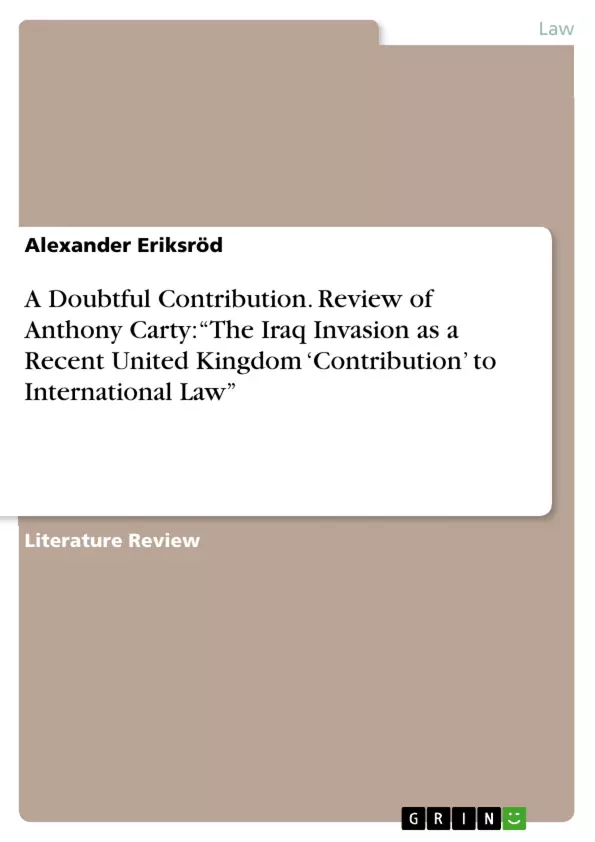This short abstract gives an overview of Anthony Carty's "The Iraq Invasion as a recent UK 'Contribution' to International Law", its main ideas and historical and political context such as of how Britain (together with its allies) framed Saddam Hussein as a threat to international peace in order to build up support for its intervention.
"The Iraq Invasion as a Recent United Kingdom 'Contribution" to International Law" was published in the European Journal of International Law Vol. 16 no. 1 (2005).
Inhaltsverzeichnis (Table of Contents)
- Content outline
- Background synopsis
- The doubtful contribution to International Law
- Invasion of sovereign state: precedent for pre-emptive attack
- UN Charter prohibition of the use of force: UN authority?
- Regime change stated as objective of war
- Influence of advisors on political decision-making
- Example: Robert Cooper
- Non-application of UN language to failed states
- IL obsolete altogether?
- Author's comments
Zielsetzung und Themenschwerpunkte (Objectives and Key Themes)
This review by Alexander Eriksroed examines Anthony Carty’s analysis of the UK's participation in the 2003 Iraq invasion and its potential impact on international law. Eriksroed analyzes Carty's arguments regarding the precedent set for pre-emptive attacks, the disregard of the UN Charter's prohibition on the use of force, and the justification of regime change as a legal objective. The review also explores the influence of advisors like Robert Cooper on political decision-making, particularly regarding the notion of "failed states" and the relevance of international law in a post-modern world.
- The legality of the Iraq invasion under international law
- The concept of pre-emptive attacks and their implications for international law
- The role of advisors in shaping political decisions
- The changing nature of international law and its applicability to "failed states"
- The potential obsolescence of international law in a world of nuclear anarchy
Zusammenfassung der Kapitel (Chapter Summaries)
The review begins by outlining Carty's argument that the UK's participation in the Iraq invasion set a precedent for pre-emptive attacks in international law. Carty highlights the UK's justification for the invasion based on Iraq's alleged threat to use weapons of mass destruction and the need to protect the Iraqi people from the Saddam Hussein regime.
Next, the review examines Carty's critique of the UK's disregard for the UN Charter's prohibition on the use of force, arguing that the invasion undermined the authority of the UN Security Council and international law. Carty also emphasizes the unprecedented step of openly stating regime change as a legal objective for the invasion.
Eriksroed then delves into the influence of advisors like Robert Cooper on the UK's decision-making process. He highlights Cooper's concept of "failed states" and his argument that the language of the UN Charter does not apply to such states, which contributed to the UK's justification for the invasion.
Finally, the review summarizes Cooper's views on the potential obsolescence of international law in a world where force is the ultimate guarantor of security, particularly in the context of nuclear proliferation. Cooper's stance on pre-emptive strikes and the need to prevent the spread of weapons of mass destruction is presented as a factor influencing the UK's decision to join the US in invading Iraq.
Schlüsselwörter (Keywords)
This review explores the key issues of international law and the Iraq war, focusing on themes of pre-emptive attacks, regime change, the role of advisors in shaping political decisions, the concept of "failed states," and the potential obsolescence of international law in a post-modern world. The analysis also considers the relevance of the UN Charter and its application in the context of contemporary global challenges.
Frequently Asked Questions
What is the core argument of Anthony Carty's review on the Iraq invasion?
Carty argues that the UK's participation in the Iraq invasion set a dangerous precedent for pre-emptive attacks and undermined established international law and the UN Charter.
How did the UK justify the invasion of Iraq in 2003?
The justification was based on the alleged threat of weapons of mass destruction (WMD) and the need for regime change to protect the Iraqi people.
Who is Robert Cooper and how did he influence the decision?
Robert Cooper was an advisor who argued that international law and UN language might be obsolete for "failed states," suggesting that force is a necessary guarantor of security in a post-modern world.
Was regime change a legal objective according to international law?
The review highlights that openly stating regime change as a legal objective was an unprecedented and controversial step that many international lawyers found doubtful.
What is the "precedent for pre-emptive attack" mentioned?
It refers to the idea that a state can invade another based on a perceived future threat, which challenges the UN Charter's prohibition on the use of force except in self-defense.
- Arbeit zitieren
- Alexander Eriksröd (Autor:in), 2014, A Doubtful Contribution. Review of Anthony Carty: “The Iraq Invasion as a Recent United Kingdom ‘Contribution’ to International Law”, München, GRIN Verlag, https://www.grin.com/document/285981



